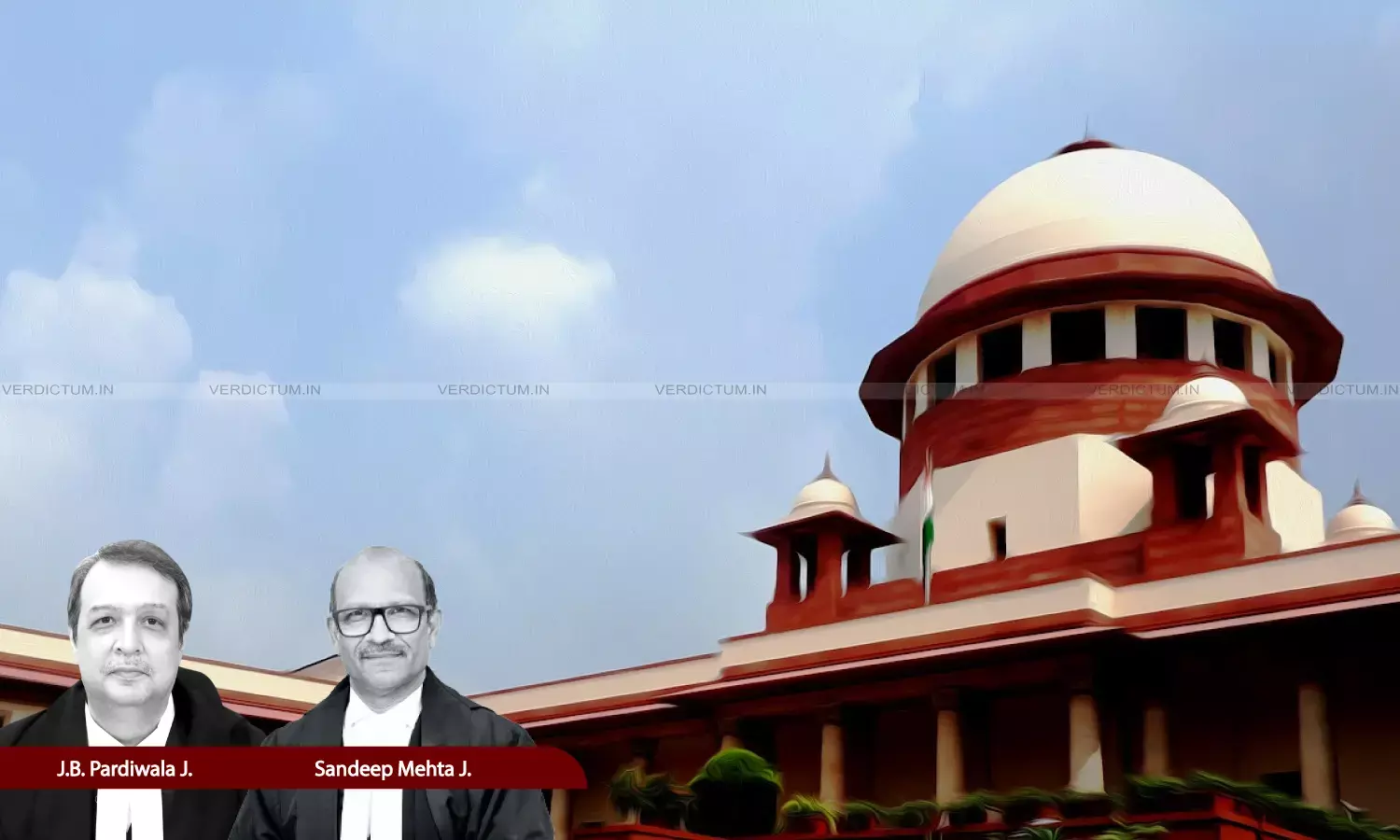Tamil Nadu Cultivating Tenants Protection Act Should Be Interpreted To Lean In Favour Of Tenants: Supreme Court
The Supreme Court also said a beneficial statute has to be construed in its correct perspective so as to fructify the legislative intent.

Justice J.B. Pardiwala, Justice Sandeep Mehta, Supreme Court
The Supreme Court observed that the Tamil Nadu Cultivating Tenants Protection Act, 1955 seeks to protect cultivating tenants from unjust evictions and it is a cardinal principle of law that in case of doubt, such Acts should be interpreted to lean in favour of tenants.
The Bench of Justice J.B Pardiwala and Justice Sandeep Mehta observed, “The Act 1955 was enacted solely to protect the interest of the cultivating tenants. In other words, the object in enacting the said Act was to protect the cultivating tenants from forcible dispossession by the landlords. In such circumstances, the provisions of the Act should also be interpreted accordingly. In other words, the provisions should be interpreted in such a manner that the tenants are ultimately protected and are not thrown out at the instance of the landlords who are always interested to see that the tenants leave.”
Advocate T.V. George represented the Appellants, while Advocate P.V. Yogeswaran represented and Advocate Kamlesh Kumar Mishra represented the Respondents.
Case Brief
The Appellants, contended that one Govindappa Gounder was lawfully cultivating the suit land. Since the Respondents were trying to interfere with the peaceful possession of the Appellants, a suit was instituted praying for permanent injunction restraining the land owners from interfering with his possession and cultivation of the subject land. The said suit was allowed. The Trial Court ordered that the land owners shall not disturb or interfere with the lawful possession of the tenant except in accordance with law.
However, there was another suit filed by the Respondents seeking permanent injunction against the Appellants, restraining them from cutting trees or from causing any damage or waste to the subject land. The suit was also allowed. Resultantly, the High Court set aside the judgment and decree passed by the First Appellate Court and restored the original decree passed by the Trial Court. Hence, an Appeal was filed by the Appellants before the Supreme Court.
Court’s Observation
The Supreme Court noted that the proceedings were instituted under the provisions of the Tamil Nadu Cultivating Tenants Protection Act, 1955 for eviction of the appellants on the ground that they caused damage to the suit land by felling trees.
While limiting the scope of litigation only to the order of eviction of the Appellants, the Supreme Court referred to the Act, 1955 and highlighted that the Act, 1955 came to be enacted for the purpose of protection from eviction of the cultivating tenants in certain areas in the State of Tamil Nadu.
The Bench said, “The short point for our consideration is whether there is any cogent material or evidence to indicate that the appellants had indulged in cutting of trees or its branches or digging up the land and thereby causing substantial damage so as to bring the case within the ambit of Section 3(2)(b) of the Act 1955.”
On the basis of the material on record, the Supreme Court concluded that there was nothing to indicate that the appellants were negligent in any manner or had done any act by which they could be said to have caused damage to the suit land.
The Court emphasised that the Act, 1955 was enacted solely to protect the interest of the cultivating tenants. The Court held, “In other words, the provisions should be interpreted in such a manner that the tenants are ultimately protected and are not thrown out at the instance of the landlords who are always interested to see that the tenants leave. It is only when there is cogent, credible and reliable evidence on record of gross violation of the provisions of Section 3(2)(b) of the Act 1955 that the Revenue Court may be justified in ordering eviction of the tenant under the Act 1955.”
Further, the Bench referred to the principle of beneficent construction and underscored that it involves giving the widest meaning possible to the statutes. When there are two or more possible ways of interpreting a section or a word, the meaning which gives relief and protects the benefits which are purported to be given by the legislation, should be chosen.
“ A beneficial statute has to be construed in its correct perspective so as to fructify the legislative intent. The Act, 1955 seeks to protect cultivating tenants from unjust evictions and it is a cardinal principle of law that in case of doubt, such Acts should be interpreted to lean in favour of tenants”, the Court held.
Accordingly, the Appeal was allowed by the Supreme Court
Cause Title: Govindappa Gounder V. K. Vijaykumar & Ors. (Neutral Citation: 2025 INSC 1134)
Click here to read/download Judgment


